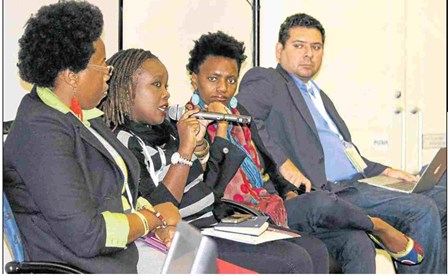
Innovation on continent moves from the margins into the mainstream, writes Xolile Mtshazo. A Social media revolution is sweeping the world and Africa has not been left out. On the contrary, the continent rates among the leaders in digital communication usage.
This was evident at the 18th annual Highway Africa conference held at Rhodes University in Grahamstown, Eastern Cape.
Africa's premier journalism conference focused on the digital age, with the theme "From Margins to the Mainstream".
Presentations, panel discussions, workshops, seminars and meetings dealt with the impact of social media on our lives over the past decade.
The gathering of media practitioners, academics, editors and journalism students from Africa and abroad deliberated on how the digital media age and the internet thrive on innovation in Africa.
Events such as the kidnapping of girls in Nigeria and the Westgate shopping mall shooting in Kenya have shown the power of social media in spreading the news before newspapers could report on it.
Fungai Machirori of the women's platform Her Zimbabwe and Rhodes University history lecturer Dr Nomalanga Mkhize led a panel discussion on identity politics and the rise of individual voices.
"As social media consumers and producers, individuals often find themselves making false claims, with few checks and balances online," said Machirori.
Mkhize said "the birth of the opinionista" had partly led to knowledge not being filtered and an erosion of verifiable, quality knowledge online.
Algorithmic censorship — the tailoring of news and online information to suit what individuals "like' on social media platforms such as Facebook— could be dangerous.
On the other side of the spectrum, ambition, active participation and social media can lead to successful community development, which Rachel Chikadaya, the coordinator of the Eastern Cape Communication Forum, spoke about.
Early this year, Chikadaya began Project 25-for-1, which raised money for Bongiwe Chuna, a girl she met at a mentoring programme at Nelson Mandela Metropolitan University in Port Elizabeth. Via Facebook and WhatsApp, she asked 25 people to donate R200 to help with Chuna's R5 000 registration fee and university fees. The response was overwhelming.
Yemi Adamolekun, the executive director of Enough is Enough Nigeria, spoke about how technology could be used to build a culture of good governance and public responsibility.
"For those of you who are online and who do have the information, teach others. Think of yourselves as a thumb, easily able to touch your other fingers," she said.
Adamolekun said Enough is Enough Nigeria employed the help of Nigerian celebrities and social media platforms to encourage people to vote during the 2011 elections, and will do so again in next year's elections. "Politicians engage through social media for three main purposes: public relations, dissemination of information and responding to questions or claims on social media."
She also discussed social media advocacy initiatives such as the #BringBackOurGirls campaign, which illustrated the rallying power of social media for activism, even though the girls have not been returned yet.
Another panel discussion centred on "privacy, safety and security in cyberspace: implications for freedom of expression", and highlighted the importance of digital literacy.
Abongile Vanda, the manager for research, policy, and advocacy at the Film and Publication Board (FPB), said increased digital literacy would help to resolve contentious issues such the publication of online child pornography.
The online environment had been "a bit of a headache for the FPB", she said.
"The FPB is the only media organisation with a hotline in Africa and people can call in to report child pornography images seen online. We also have global connections, so if the website is not in South Africa, the content can still be taken down in the country that hosts the site."
Sue Valentine, Africa's programme co-ordinator for the Committee to Protect Journalists ((.PJ), showed why cyberspace security literacy was essential. The CPJ is involved in a campaign called The Right to Report in the Digital Age (#RightToReport).
"The US government must be challenged because the Obama administration has been the most aggressive when it comes to surveillance and spying on people," she said.
Xolile Mtshazo was at the conference courtesy of MTN.
Article by Xolile Mtshazo
Article Source: Sunday World
